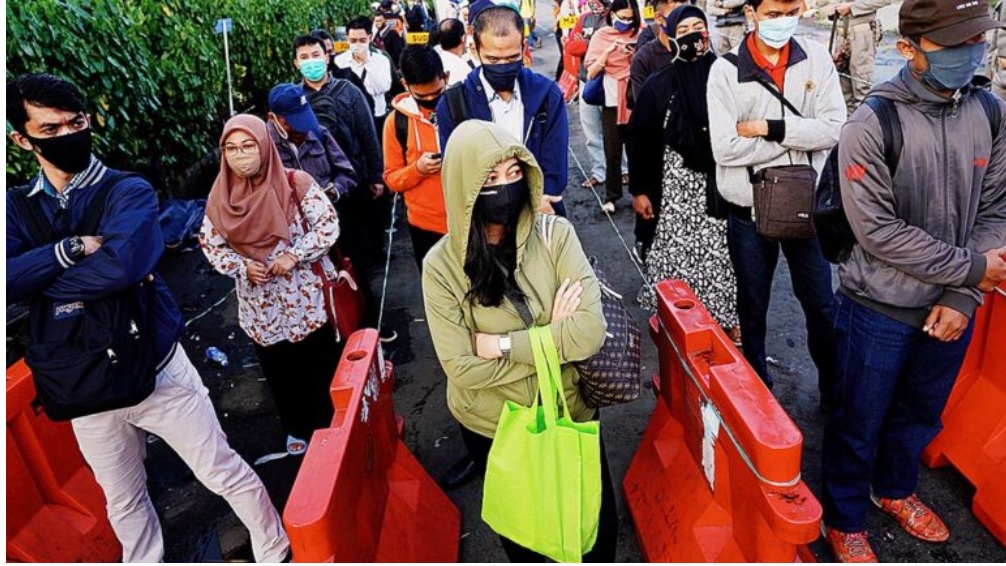Social Restrictions Ineffective without Public Awareness
Hana Fajria –FEB UI Public Relations Officer
JAKARTA, KOMPAS, 27 July 2020 – Kompas.com quoted the Head of the Demography Institute of FEB UI, Turro S. Wongkaren, on the possibility of the tightening of the large-scale social restrictions (PSBB). According to Turro, PSBB will not be effective without a change in public behavior in affected areas. This behavior is related to religion and culture, among other things. Issuing regulations based on practical health, economic or political matters is not enough. What we need is a socio-cultural approach in order to understand how behavior can change. This is because tightening and then relaxing PSBB will only make people resume old behavior and ignore health protocols. “In order to change people’s behavior, apart from creating a mechanism that can lead to a desired behavior, the role of religious, cultural and other social figures is important,” said Turro.
Human mobility in Jakarta is dominated by workers as administrative and business centers are still in the capital city, which is why all commuters travel there. The implementation of the large-scale social restrictions to limit human mobility is deemed ineffective as long as public awareness of the safety protocols during the Covid-19 pandemic remains low.
“In terms of the map of human mobility, there has not been any significant change from 2014 and 2017 data. As many as 81 percent of commuters in Jakarta are workers,” said Turro when contacted from Jakarta on Monday (27/7/2020). The rest are people who do other activities, such as shopping, going to school, attending courses, and visiting relatives.
The majority of commuters come from the city of Depok. The second largest number come from Bekasi, Bogor and South Tangerang. Most of the commuters head to South Jakarta where most of business buildings are located, such as the Senayan, Sudirman and Kebayoran Lama areas. Central Jakarta and East Jakarta come next as the most visited areas.
Health experts consider human mobility as the cause of the increasing number of positive cases of Covid-19. Last week, positive cases were detected in office areas. On Monday, Arif Prabowo, Deputy Director for Communications, TelkomGroup Company, confirmed that one of his employees was tested positive for Covid-19. Therefore, TelkomHub’s office in Gatot Subroto Street has been temporarily closed for sterilization.
Data from the Jakarta Provincial Government show that a total of 19,474 positive cases have been recorded. A total of 11,997 people have recovered and 782 people have died. Another 2,226 people were suspected to have been infected and 276 of those suspected of having been infected by Covid-19 have died.
The pattern of case finding was still the same, namely 55 percent found in people who did not have symptoms of fever, cough, runny nose, or shortness of breath. The Jakarta Health Office stated that the only way to prevent transmission was by wearing a mask, maintaining physical distance, and washing hands using soap.
Awareness
Turro explained that given the increase in human mobility to meet growing economic needs, PSBB will not be effective. Firstly, it risks a social upheaval. Secondly, quarantine is ineffective if public awareness about the coronavirus is nonexistent or does not increase.
If PSBB is reinstated without raising public awareness, what will happen after it ends is public euphoria, with people leaving the confines of their home all at once, creating unexpected crowds. So far, there has not been any effort to optimize local wisdom as a means of increasing public awareness. The campaigns conducted to raise public awareness are still very technical, using health, political and economic jargons not many people understand.
“What we see is people thinking “I feel healthy, I definitely will not be infected.” or “My neighbor often goes out and is fine, really.” The notion that viruses are dangerous and should be avoided by following security protocols has yet to become a mainstream thinking. Religious leaders, for example, have yet to make it a routine to remind their congregation during worship to always wear a mask and maintain their distance,” said Turro.
Interviewed separately, Roni Adi, the Chairman of the Betawi Kita Community, said that they had held campaigns to promote various aspects of the Betawi traditional culture to prevent Covid-19 transmissions, including by holding a rhyme recitation competition with the theme of the dangers of the new coronavirus and the need to wear a mask and to wash your hands frequently.
He revealed that several months ago, the Betawi Kita Community held a discussion about the history of the pandemic in Batavia. It is noted that since the 18th century, there have not been many changes in behavior, from littering to the need to live a healthy lifestyle. In fact, the life principles in the Betawi culture support a good way of life.
He cited as examples the Earth Offerings, Sea Offerings, and Village Cleanup rituals. “Village Cleanup can also be interpreted as a disease-free environment. Apart from being physically clean, diseases must also be avoided. In the context of Covid-19, by implementing health and safety protocols,” he said.
“Village Cleanup can also be interpreted as a disease-free environment. Apart from being physically clean, diseases must also be avoided. In the context of Covid-19, by implementing health and safety protocols,” said Roni.
Roni explained that the Betawi people have a high sense of self-respect and uphold family honor. This principle can be used so that people follow the instruction to wear a mask and to keep their distance. Social and administrative sanctions for those who breach the security protocols should be considered an embarrassment for the individual and his family.
“The Betawi culture emphasizes effort. At present, sincere efforts are also being made to ensure that we do not harm others by spreading the virus,” he said.
(lem)

